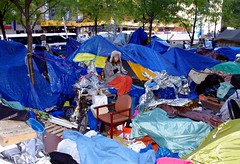 Whether you support the Occupy Movement, are against it, or are somehow unaware of its existence, one thing remains true. This is a historic event. Generations from now, genealogists will wonder if any of their ancestors were part of the 99%. This year, Thanksgiving was celebrated in a different way.
Whether you support the Occupy Movement, are against it, or are somehow unaware of its existence, one thing remains true. This is a historic event. Generations from now, genealogists will wonder if any of their ancestors were part of the 99%. This year, Thanksgiving was celebrated in a different way.
Holidays, and the way we celebrate them, are important. Thanksgiving is usually a day that people spend with their families, in a warm and comfortable home, surrounded by plenty of good food. It is a day to give thanks for everything that we have.
Genealogists can learn a lot about their families on Thanksgiving. They can ask their relatives questions about birth dates, the day a person got married, or for clarification about family stories that had been handed down from one generation to the next. The foods that your family chooses to eat on Thanksgiving, and the way those foods are prepared, says a lot about your cultural heritage.
One of the most important, and often overlooked, parts of Thanksgiving is “thankfulness”. It is a time when people can acknowledge all the blessings that they have, and that they are grateful for. This is one of the times in the year when families donate to local food pantries, and try to help those who are less fortunate than they are.
This Thanksgiving, all across America, there is something going on that will make the history books. The Occupy movement began as “Occupy Wall Street”. The movement has since spread to several other cities across the United States. It is a protest against corporate greed and corruption.
It has been said that the Americans who are the wealthiest 1% hold an inordinate amount of power over the remaining 99% of the population. Many people are extremely unhappy about what the 1% has chosen to do with that power, and many others want to see wealth and opportunity spread more equally across the population.
Today, many of the protesters, who have been living in tents with no plumbing or heat for several months, were able to celebrate Thanksgiving. Several of the protesters are people who lost their jobs, and then their homes, when the economy crashed.
Glide Memorial Church served traditional Thanksgiving fixings to 400 occupiers in the financial district of San Francisco, California. In Oakland, California, occupiers had a Thanksgiving feast outside City Hall, while music was played and speaker Clyde Bellecourt, co-founder of the Minnesota-based American Indian Movement, spoke.
Somewhere between 2,000 and 3,000 Thanksgiving meals were distributed to occupiers and homeless people in Zuccotti Park, in Manhattan, New York. Demonstrators in Washington D.C set up a food donation table, and area residents dropped of food, trimmings, and dessert for the protesters. In Memphis, Tennessee, around 30 people were able to sit down to a traditional Thanksgiving meal.
During The Great Depression, there were millions of Americans who had no jobs, and no way to feed their families. Many families became homeless, and set up encampments. At the time, these were called “Hoovervilles”, a name which pointed out that J. Edgar Hoover was President of the United States during this incredibly difficult period in American history. Did any of your ancestors live in a “Hooverville”? Now might be a good time to find out.
Image by David Shankbone on Flickr

